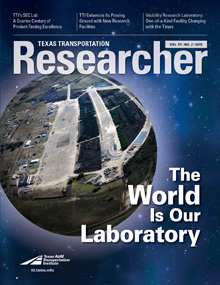The bottom line for the driving public is safer, smoother rides on better roads at a lower cost. The facilities at the Texas A&M Transportation Institute’s (TTI’s) McNew Laboratory allow sponsors to access some of the most advanced, state-of-the-art equipment to help achieve those goals.
Located behind the Civil Engineering/TTI Building at Texas A&M University, the McNew Lab includes a basement prep area, ground-floor testing facilities and first-floor evaluation area. Recently, the 50+-year-old laboratory was modernized to optimize space and upgrade equipment.

“One of the things I like to promote with our lab is that we’re able to test what’s currently the state of the practice, as well as help develop new test procedures that could become the next industry standards,” says TTI Associate Research Scientist Stephen Sebesta.
The basement of the facility is used for rock-and-dirt sample preparation. Technicians from TTI’s Materials and Pavements Division travel to locations around the state to gather samples.
“The basement is referred to as the works-in-progress area and is the least technical of the entire facility,” explains TTI Senior Research Engineer Tom Scullion. Scullion is a Regents Fellow and manages the Flexible Pavement Program. “It’s used to process bulk materials, and there is some sample preparation for soil and base materials. So it’s kind of where everything begins.”
The ground floor houses 16 environmental chambers that, regardless of the weather outdoors, can condition pavement samples to temperatures as high as 140°F; alternatively, researchers can drop a sample’s core temperature to a bone-chilling -20°F. Researchers can adjust the ambient humidity from a dry 25 percent to a moist 100 percent humidity.
“Basically the idea is that the walk-in chambers can simulate any type of operational environment,” says Sebesta.
The Asphalt Binder Research Laboratory — run by TTI Research Engineer Fujie Zhou — is also located on the ground floor. This lab performs advanced chemistry research on asphalt binders to help determine the binder’s impact on the performance of asphalt mixtures.


“We can perform tests known as rheological characterization, which tests how the asphalt binder deforms or moves under different environmental conditions and stress states, and we use the chemical analysis to help explain our observations” says Sebesta.
The Bituminous Mixture Molding Laboratory houses several pieces of equipment unique to Texas. One example is a device that makes foamed asphalt samples for testing. Foamed asphalt has shown great promise as a cost-effective alternative for upgrading roadways impacted by energy-sector developments. The lab also houses a linear kneading compactor, which can produce 22-by-22-inch slab samples using a rolling wheel compactor. Researchers can conduct skid resistance assessments and take polishing and sound measurements with the slab samples.
“Our goal is to develop asphalt mixes that optimize friction and decrease roadway noise,” says TTI Research Engineer Cindy Estakhri, who manages TTI’s Recyclable Materials Program. “This equipment allows us to conduct testing in a controlled environment to help us achieve that goal.”
Moving up to the top floor, this area is used for performance tests.
“The top floor is the area where we run advanced performance tests on the samples made on the lower floors. Before recommending samples for field use, they must perform well in the lab,” says Sebesta. “A lot of the performance tests that we develop become standard in the field with departments of transportation across the country.”
Several performance testing labs are located on this floor, and researchers use a wide variety of testing equipment that includes:
- A Texas overlay tester,
- A Hamburg Wheel Tracker,
- An asphalt pavement analyzer,
- A disk-shaped compact tension and semi-circular bending machine, and
- Universal test machines.
“We’re trying to address some of the major problems the Texas Department of Transportation [TxDOT] is having right now,” states Scullion. “One of them involves the testing and strengthening of rural roadways in areas where energy development has been at its peak. We’re here to support TxDOT’s research program, and the McNew Lab is a very well-equipped, cutting-edge facility to help accomplish that goal.”
